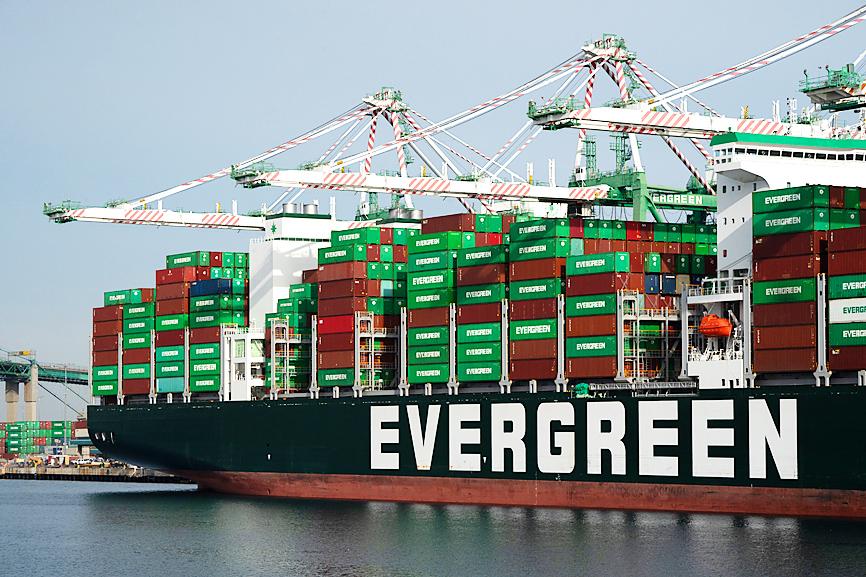Taiwan’s export orders totaled a record US$57.78 billion last month, up 12 percent month-on-month and 29.7 percent year-on-year, the Ministry of Economic Affairs said yesterday.
The better-than-expected results were boosted by “a certain recently released smartphone product by an international company,” Department of Statistics Director Huang Yu-ling (黃于玲) told a news conference in Taipei.
Apple Inc, which used to release its new iPhone models in September, delayed this year’s launch to Oct. 23 due to production disruptions caused by the COVID-19 pandemic.

Photo: Bloomberg
“We can’t give exact figures, but it’s quite clear that the smartphone launch in question has had a very substantial effect,” Huang said. “It partially explains why 59.2 percent of the goods supplied by Taiwanese exporters were manufactured abroad,” up 3.3 percentage points year-on-year.
The trend of local manufacturers moving their production back home is “here to stay,” but iPhones are mostly made by Taiwanese contract manufacturers in China, she said.
Export orders for information and communication technology (ICT) products hit a record high of US$20.82 billion, up 39.4 percent year-on-year, on the back of seasonal demand for laptops and tablets, as well as the iPhone launch, Huang said.
Orders for electronic products also set a record of US$17.19 billion, up 37.8 percent year-on-year, while optical product orders were US$2.37 billion, up 27.8 percent year-on-year, ministry data showed.
Non-tech industries also posted growth in orders last month, with plastic product orders increasing 20 percent year-on-year to US$2.14 billion, basic metal orders advancing 25.2 percent to US$2.43 billion and mechanical products climbing 11.5 percent to US$1.86 billion.
Only orders for chemical products dipped on depressed international oil prices, falling 4.4 percent to US$1.53 billion, the data showed.
The US accounted for US$18.13 billion of all export orders, up 30.6 percent annually, while US$12.83 billion of orders came from China and Hong Kong, up 23.3 percent, and US$14.39 billion of orders came from Europe, up 50.2 percent.
In the first 11 months of this year, total export orders increased 7.3 percent year-on-year to US$473.11 billion, the ministry said.
Export orders are forecast to total US$56.5 billion to NT$58 billion next month, which would translate into a 2.2 percent monthly decline and a 29 percent annual increase on the low end of the estimate, and a 0.4 percent monthly increase and a 32.5 percent annual increase on the high end, the ministry said.
This means for the whole year estimated export orders would be US$529.7 billion to US$531.1 billion, or annual growth of 9.3 to 9.6 percent, the ministry said.
“While this rate of growth in export orders is not exactly historic, it is remarkable that we are able to accomplish this in a pandemic year,” Huang said.

South Korea’s equity benchmark yesterday crossed a new milestone just a month after surpassing the once-unthinkable 5,000 mark as surging global memory demand powers the country’s biggest chipmakers. The KOSPI advanced as much as 2.6 percent to a record 6,123, with Samsung Electronics Co and SK Hynix Inc each gaining more than 2 percent. With the benchmark now up 45 percent this year, South Korea’s stock market capitalization has also moved past France’s, following last month’s overtaking of Germany’s. Long overlooked by foreign funds, despite being undervalued, South Korean stocks have now emerged as clear winners in the global market. The so-called “artificial intelligence

‘SEISMIC SHIFT’: The researcher forecast there would be about 1.1 billion mobile shipments this year, down from 1.26 billion the prior year and erasing years of gains The global smartphone market is expected to contract 12.9 percent this year due to the unprecedented memorychip shortage, marking “a crisis like no other,” researcher International Data Corp (IDC) said. The new forecast, a dramatic revision down from earlier estimates, gives the latest accounting of the ongoing memory crunch that is affecting every corner of the electronics industry. The demand for advanced memory to power artificial intelligence (AI) tasks has drained global supply until well into next year and jeopardizes the business model of many smartphone makers. IDC forecast about 1.1 billion mobile shipments this year, down from 1.26 billion the prior

NEW IDENTITY: Known for its software, India has expanded into hardware, with its semiconductor industry growing from US$38bn in 2023 to US$45bn to US$50bn India on Saturday inaugurated its first semiconductor assembly and test facility, a milestone in the government’s push to reduce dependence on foreign chipmakers and stake a claim in a sector dominated by China. Indian Prime Minister Narendra Modi opened US firm Micron Technology Inc’s semiconductor assembly, test and packaging unit in his home state of Gujarat, hailing the “dawn of a new era” for India’s technology ambitions. “When young Indians look back in the future, they will see this decade as the turning point in our tech future,” Modi told the event, which was broadcast on his YouTube channel. The plant would convert

People stand in a Pokemon store in Tokyo on Thursday. One of the world highest-grossing franchises is celebrated its 30th anniversary yesterday.